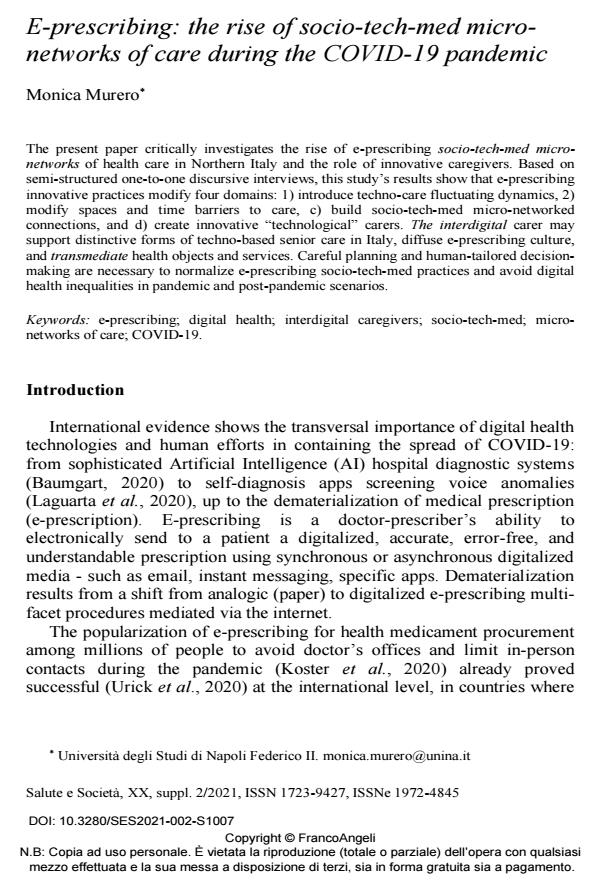E-prescribing: the rise of socio-tech-med micronetworks of care during the COVID-19 pandemic
Titolo Rivista SALUTE E SOCIETÀ
Autori/Curatori Monica Murero
Anno di pubblicazione 2021 Fascicolo 2021/suppl. 2
Lingua Inglese Numero pagine 15 P. 104-118 Dimensione file 689 KB
DOI 10.3280/SES2021-002-S1007
Il DOI è il codice a barre della proprietà intellettuale: per saperne di più
clicca qui
Qui sotto puoi vedere in anteprima la prima pagina di questo articolo.
Se questo articolo ti interessa, lo puoi acquistare (e scaricare in formato pdf) seguendo le facili indicazioni per acquistare il download credit. Acquista Download Credits per scaricare questo Articolo in formato PDF

FrancoAngeli è membro della Publishers International Linking Association, Inc (PILA), associazione indipendente e non profit per facilitare (attraverso i servizi tecnologici implementati da CrossRef.org) l’accesso degli studiosi ai contenuti digitali nelle pubblicazioni professionali e scientifiche.
The present paper critically investigates the rise of e-prescribing socio-tech-med micronetworks of health care in Northern Italy and the role of innovative caregivers. Based on semi-structured one-to-one discursive interviews, this study’s results show that e-prescribing innovative practices modify four domains: 1) introduce techno-care fluctuating dynamics, 2) modify spaces and time barriers to care, c) build socio-tech-med micro-networked connections, and d) create innovative "technological" carers. The interdigital carer may support distinctive forms of techno-based senior care in Italy, diffuse e-prescribing culture, and transmediate health objects and services. Careful planning and human-tailored decisionmaking are necessary to normalize e-prescribing socio-tech-med practices and avoid digital health inequalities in pandemic and post-pandemic scenarios.
Parole chiave:e-prescribing; digital health; interdigital caregivers; socio-tech-med; micronetworks of care; COVID-19
- Pervasive Computing Technologies for Healthcare Ana Vasconcelos, Joana Couto Silva, Ruben Moutinho, Fernando Ricaldoni, Ana Correia de Barros, Francisco Nunes, pp.151 (ISBN:978-3-031-59716-9)
Monica Murero, E-prescribing: the rise of socio-tech-med micronetworks of care during the COVID-19 pandemic in "SALUTE E SOCIETÀ" suppl. 2/2021, pp 104-118, DOI: 10.3280/SES2021-002-S1007